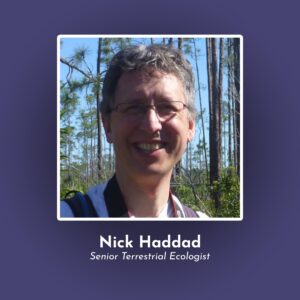
Show Summary
On this episode, Nate is joined by Professor Nick Haddad, a conservation scientist with a focus on butterflies and other insects. Nick unpacks what decades of research have indicated about the declining state of insect populations, which act as the foundation of critical ecosystem functions. The overlooked degradation of butterflies, beetles, bees, ants, ladybugs, and countless other species have huge ripple effects across our local and global ecological functions – from a loss of bird populations to a reduced ability to grow food. Why are we not more concerned about the health and vitality of these critical organisms? Can humans – or life as we know it – survive without these little creatures? What can we do as individuals, businesses, and governments to help insects rebound as quickly as possible, and in turn strengthen the health of everything else.
About Nick Haddad
Professor Nick Haddad is co-lead of the Long Term Ecological Research site at Kellogg Biological Station at Michigan State University. He leads decades-long, landscape-scale experiments that bring scientific principles to conservation actions. He studies how landscape diversity, including prairie strips through croplands, affect biodiversity, especially of plants and insects, and of ecosystem services including pollination, biocontrol, and decomposition. For three decades he has led the world’s largest experiment testing the role of landscape corridors in increasing dispersal of most plant and animal species, and increasing plant diversity. He has conducted long-term restoration experiments to guide conservation of rare butterflies in the face of climate and land use change. Nick brings together ideas in science and management through ConservationCorridor.org.
In French, we have a motto that says that a simple drawing is often better than a long explanation. Jean-Marc Jancovici Carbone 4 President
That’s very understandable because with left atmosphere thinking, one of the problems is that you see everything as a series of problems that must have solutions. Iain McGilchrist Neuroscientist and Philosopher
We can’t have hundreds and hundreds of real relationships that are healthy because that requires time and effort and full attention and awareness of being in real relationship and conversation with the other human. Nate Hagens Director of ISEOF
This is the crux of the whole problem. Individual parts of nature are more valuable than the biocomplexity of nature. Thomas Crowther Founder Restor
Show Notes & Links to Learn More
Download transcript00:21 – Nick Haddad Works + Info, The Last Butterflies: A Scientist’s Quest to Save a Rare and Vanishing Creature
01:58 – 20% of the world’s freshwater is in the Great Lakes
02:30 – Aquatic Insects
04:01 – Blue Crabs
08:41 – St Francis Satyr
10:45 – Importance of natural wildfires to ecosystems
11:09 – Difference between natural disturbance and human-caused wildfires
13:18 – Wildlife in Chernobyl
13:38 – Military areas are often wildlife refuges
14:17 – 20,000 species of butterflies
14:35 – 200,000 moth species
14:35 – Difference between butterfly and moth species
15:25 – Luna Moths
16:10 – Critically endangered butterflies in the US and the world
18:03 – Citizen Science
19:15 – Humans and insects in evolution
19:20 – Modular mind
19:36 – Cats and cucumbers
20:15 – Butterfly caterpillars mimicking snakes
20:22 – Spicebush Swallowtail
21:40 – 5.5 million insect species
25:18 – Wolf Spider
26:10 – Fear of butterflies
27:07 – 1-2% loss of global insect biomass per year
29:57 – Butterflies in Ohio are declining 2% per year
31:07 – Monarchs are declining
33:04 – Insect decline in the Anthropocene: Death by a thousand cuts
33:36 – More than 75 percent decline over 27 years in total flying insect biomass in protected areas
37:33 – Butterflies pollinate 10% of cotton, 60 million dollars per year in Texas alone
38:40 – Birds in the US decline at 2% per year
39:19 – A strong factor of young bird survival is abundance of insects
40:38 – Insects are the foundation of life as we know it on Earth
41:41 – Insects and soil health
41:59 – Complexity of plants and ant species video
43:39 – Decline of bugs on car windshield
44:31 – Daniel Pauly + TGS Episode, Shifting Baselines
46:20 – Native prairie corridors
47:55 – Primary drivers of insect loss
49:14 – Neonicotinoids and insect loss
52:36 – Soil-based insects
55:47 – We overapply pesticides
56:23 – Neonicotinoids banned in Europe
59:10 – If left alone, fish populations can swiftly recover
1:00:05 – E.O. Wilson, Half Earth
1:01:06 – 30 by 30
1:01:55 – Development of targeted pesticides
1:04:59 – Rise of pollinator gardens
1:08:20 – Monarchs can fly almost 100 miles in 1 day
1:11:03 – Butterfly Survey Organizations
1:12:47 – Endangered Species Act
1:15:10 – IUCN Red List global extinction criteria
1:16:19 – National Nature Assessment
1:24:25 – Underproductive farm acres in the US
More: The collapse of insects






